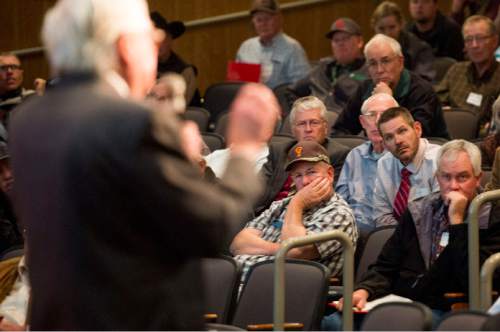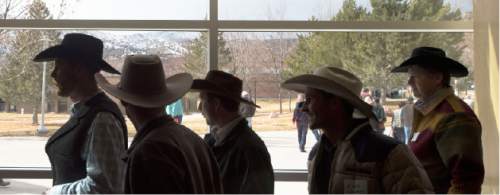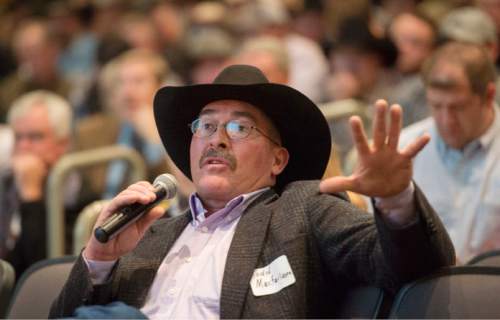This is an archived article that was published on sltrib.com in 2016, and information in the article may be outdated. It is provided only for personal research purposes and may not be reprinted.
Richfield • Several years ago, the BLM trimmed the Gloeckner ranch's federal grazing allotment by about 170,000 acres. The move cut off access to 11 springs to which the ranch held water rights, according to proprietor Kena Lytle Gloeckner.
That was just one of many actions her family says were made arbitrarily and put unnecessary burdens on their million-acre operation around Nevada's Eagle Valley just west of the Utah state line near Pioche.
The Gloeckners had been negotiating with the Bureau of Land Management to get their stocking levels restored for the past few years when the agency brought in a new crew of officials who had no idea what had been discussed.
"It's been a nightmare. Hopefully it can be resolved before they run us out of business," Gloeckner said during a break at a grazing conference the Utah Farm Bureau Federation hosted with the state Public Lands Policy Coordinating Office on Thursday. "There is nothing wrong with our range. It's as good as it's ever been."
The Gloeckner ranch exemplifies the uncertainties facing public lands livestock ranchers in the West. And uncertainty — mostly stemming from fickle administration of federal land policies — has played a key role in the disappearance of the ranching business, according to Farm Bureau CEO Randy Parker.
There are now about 8,000 livestock operations, down about 60 percent from 1950, Parker told the 300 ranchers who gathered at the Sevier Valley Center, next to Snow College's Richfield campus.
Though the event had been planned for eight months, it convened during a tumultuous moment for public lands grazing. The Malheur Wildlife Refuge occupation, provoked by alleged mistreatment of an Oregon ranching family by federal authorities, brought many long-simmering tensions to the surface over the way grazing allotments are managed.
Top BLM and Forest Service supervisors were on the agenda to speak at the Richfield event, but they were pulled at the last minute at the request of conference organizers.
Emotions are running high in Utah, particularly in Piute County just down the road. Last month, Sheriff Marty Gleave confronted a Fishlake National Forest ranger at a County Commission meeting. Forest staff had notified two ranchers that they were out of compliance with their permits, prompting the sheriff to threaten Forest Service personnel with arrest if they tried to seize the ranchers' cattle, according to minutes of the meeting.
Asked about this incident, Fishlake supervisor Mel Bolling emphasized the rapport forest staff has built with most ranchers on his forest that covers Monroe, Tushar and other central Utah mountains.
"Ninety percent of our permit holders are excellent stewards, and we have a good working relationship with them. There is always room for improvement on either side," Bolling said. "A pitfall of the agency is we don't tell our story enough, whether it's working with ranchers or the good work we do on the ground, installing troughs, fixing fences and helping with range improvements."
He said he is committed to working out ranchers' problems, a sentiment often echoed by his BLM counterparts.
"I consider this [the Fishlake] a working forest. We have mineral production, we have range, water, wildlife. All the multiple uses are represented in a unique and interesting way that benefits this part of the state."
Still, ranchers in Utah and other Western states say federal "overreach" is running them out of business. Industry critics counter that ranchers have gotten a generous ride at the public's expense.
"We need to learn to respect their opinion, and they need to respect ours. The battle shouldn't be on the range, it should be in the ballot box," said retired rancher Tom Hatch, a former Utah lawmaker. "We aren't as organized as the [environmental groups]. They have more funding. We need to follow the Federal Register and submit comments, we need to talk to elected leaders and hold their feet to the fire. I believe this is a battle we can win."
Stuck in the middle between rural producers and urban environmentalists are the Forest Service and the BLM, agencies that administer more than half of Utah's land. The state is poised to sue the federal government to gain title to about 31 million acres of public land, claiming it can do a better job managing these natural resources.
The Utah Farm Bureau endorses land transfer, considered a legal dead end by many scholars.
In the meantime, the Utah Attorney General's Office and the state's congressional delegation said they would avail their staffs to help ranchers work out issues with federal agencies.
But Tony Rampton, assistant attorney general and section chief of public lands, cautioned ranchers to stay on the correct side of the law. He said the movement to disavow federal contracts is based on distorted legal claims that ranchers hold a "property right" to graze their allotment.
No such right exists.
"If you signal to government you are going to send back your permit, what is that going to do to the rest of you in the eyes of the public?" Rampton said. "There is a term, 'welfare ranchers.' It is horrid and entirely inaccurate, but that's what you are going to hear if you graze on public lands without a permit. I am with you on this."
"It doesn't sound like it," a rancher shot back.
During a Q and A, Todd Macfarlane, the Kanosh lawyer urging ranchers to disavow their BLM contracts, addressed Rampton's criticisms.
"At the end of the day, we all have the same objective here in Utah," Macfarlane said. "We want to protect the ranching industry. I appreciate what you are doing, but I think there can be other ideas and theories."
Macfarlane rented a room at the venue and invited ranchers to hear from his speaker, Angus McIntosh, whose doctoral research forms the basis of Macfarlane's claims.
"You can believe whatever you want to believe," Rampton said. "We have done our best to ferret out the law and advise you on your rights. Before you do anything, talk to a lawyer. Don't rely on academic papers. Don't rely on statements made by people who have no legal duty to you."







